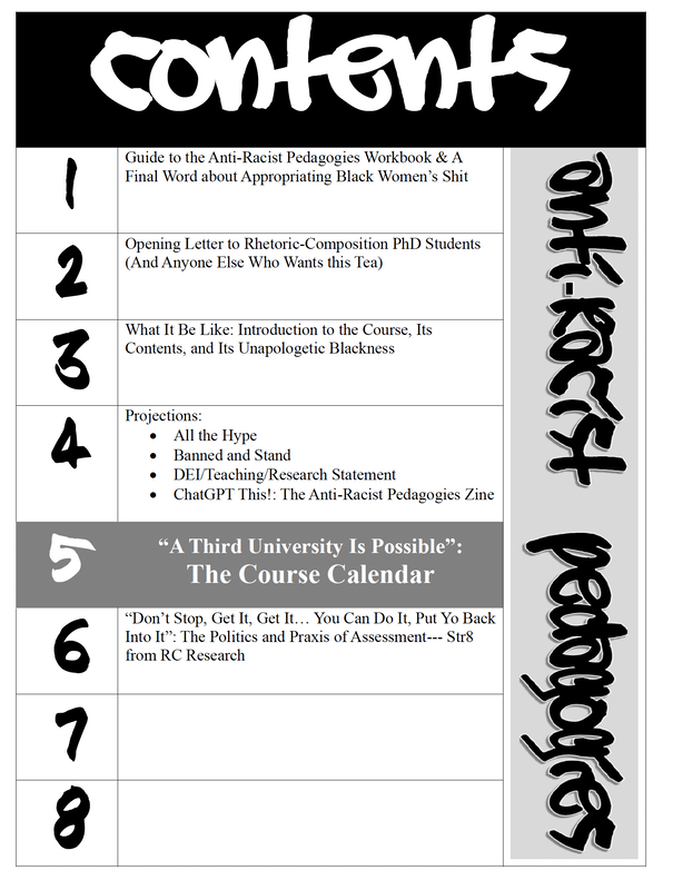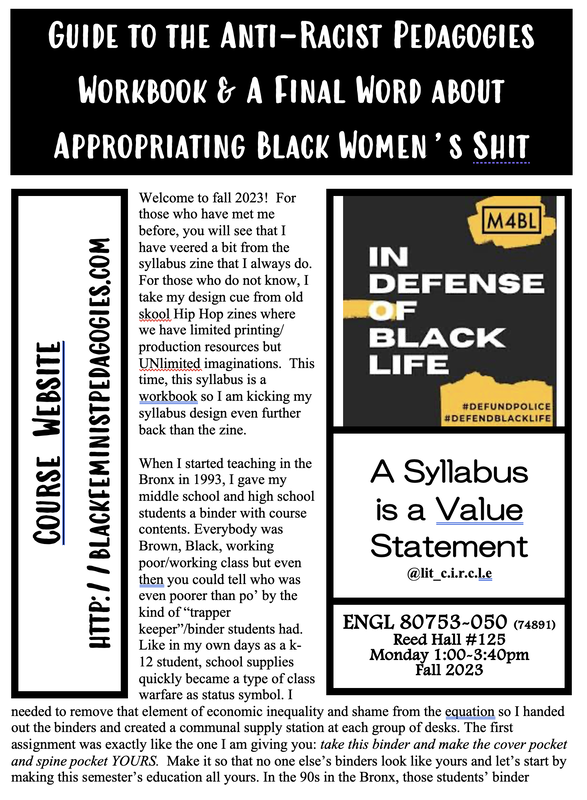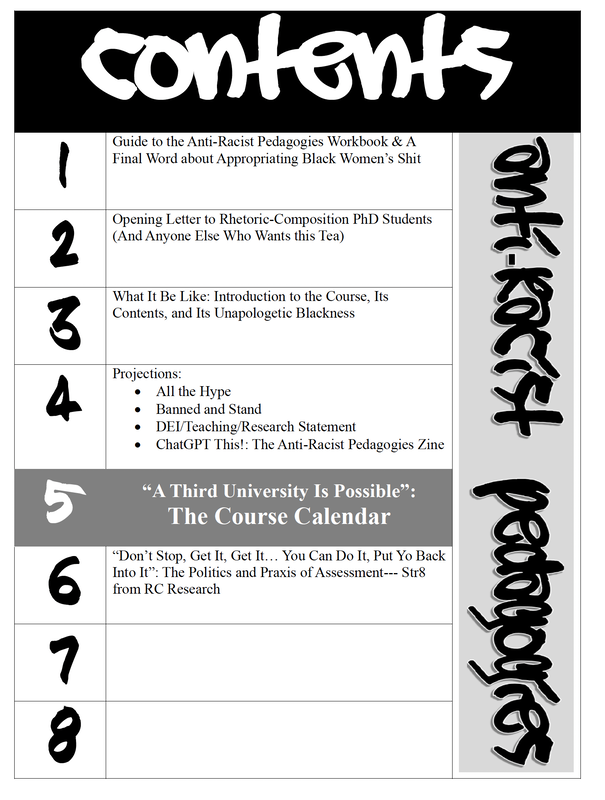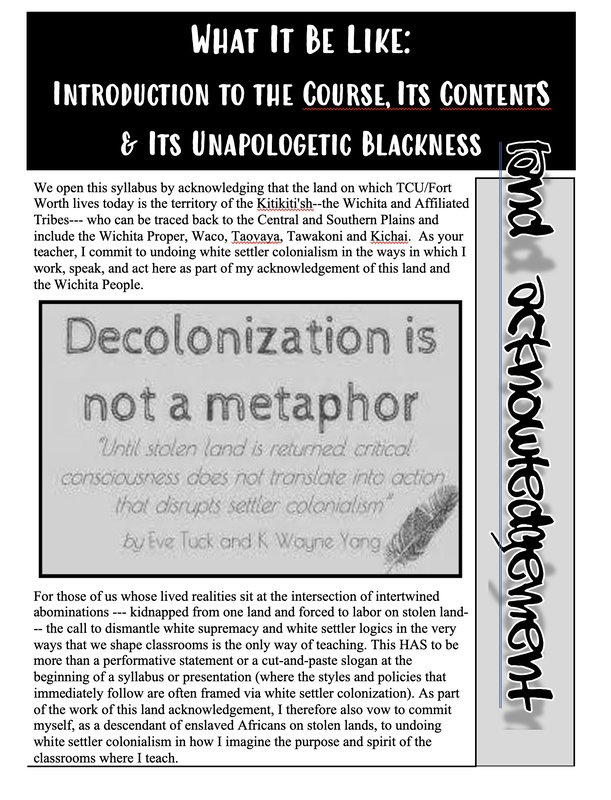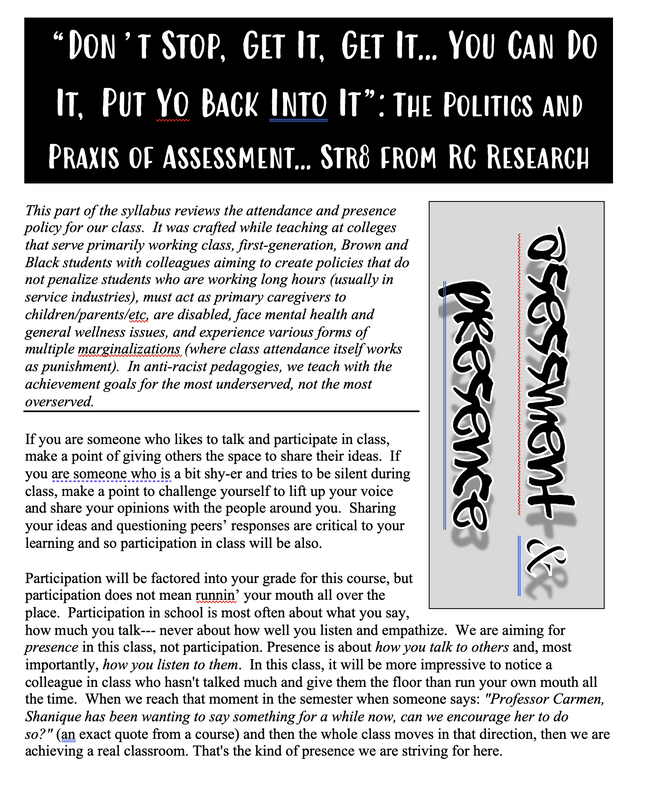"A 3rd University Is Possible": Anti-Racist/ Anti-Colonial Pedagogies… Beyond 2023 Performativities
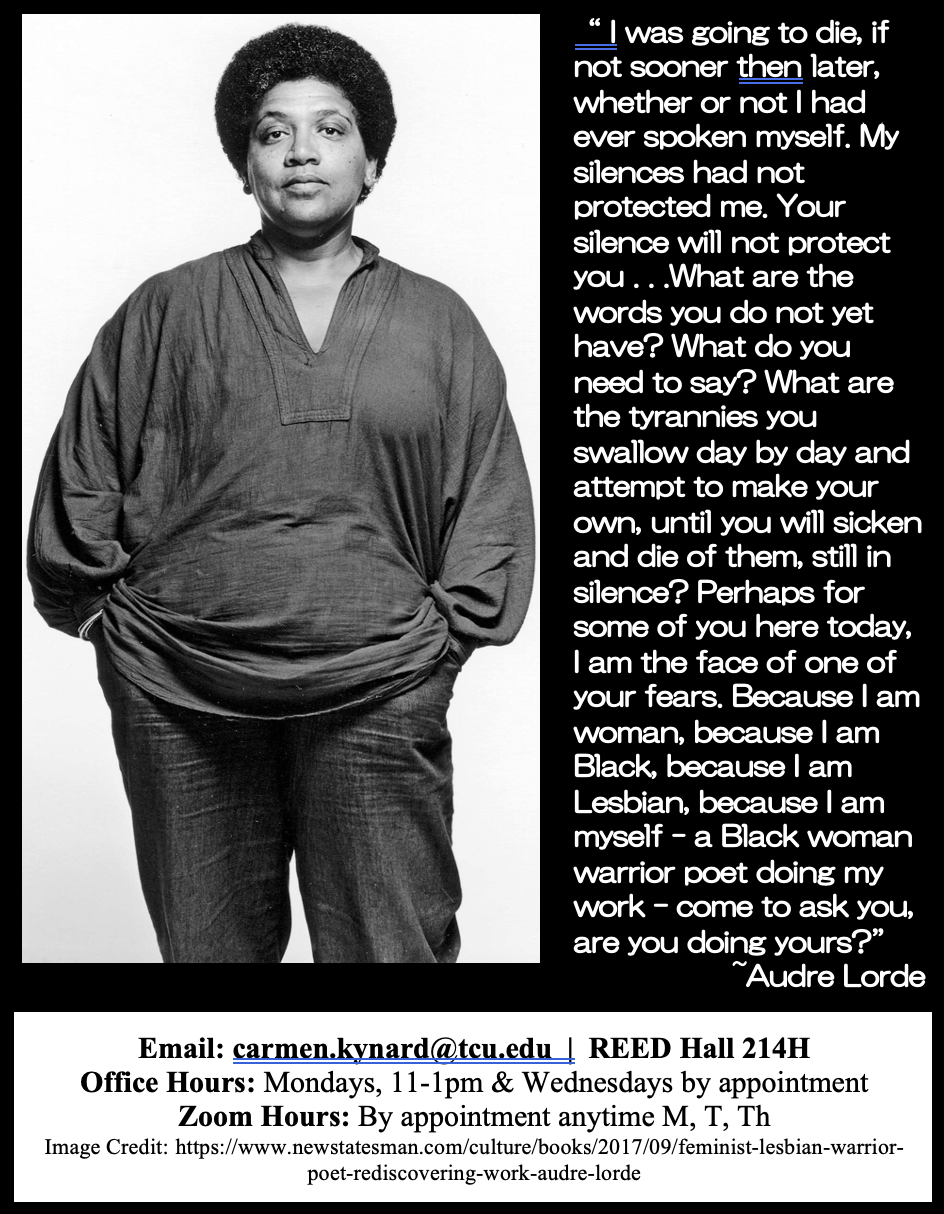
In this course, we ask ourselves what it means to intervene in and/or interrupt pedagogies, methodologies of classroom research, and white institutional affect towards anti-racist goals. We draw heavily from: educational sites committed to theories/praxis of decolonization, the Black Radical Tradition, theories centered on the eradication of anti-blackness, work that critiques post-humanism, political trajectories that embrace intersectionality, transformations made possible by QTPOC critique, and the legacies of feminisms of color. We especially spend time early in the semester with the work of la paperson whose 2019 book insists that a Third University is Possible, now the namesake of the course. The course contextualizes pedagogy as a deeply intellectual and theoretical project (as opposed to a set of standards, learning outcomes, common syllabi, or classroom lesson plans) where we can intervene in college classroom spaces--- which we will treat as geographies that do the day-to-day/minute-to-minute work of maintaining institutional oppressions. Though this class is taught from and inspired by the pedagogical methodologies and disciplinary ideologies of composition-rhetoric studies, we will not confine ourselves therein or any discipline that western culture has designed. We will therefore engage urban education, literacy studies, communication studies, and Black critical theory in order to explore central themes in anti-racist pedagogies that will include (but are not limited to): critical race English education/ composition-rhetoric studies, Black Crit, raciolinguistics, decolonization, decolonial refusal, and abolition.
The course does not assume that there are any ready-made answers to these questions or that composition-rhetoric studies should be the locus of such polemics. However, the historical entry of composition studies in the academy and its nesting with literacy in higher education mean that it can never hide from racial-pedagogical truths in ways that other disciplinary categories have seemingly mastered.
Our goal is to see and treat BOTH anti-racism and pedagogies broadly. Anti-racism, especially at this moment, has been largely appropriated and domesticated towards a kind of individualistic behavior modification. Some of its main scholars make upwards of 30K per workshop and have so much money to spend that they flout multiple vacation homes and mansions. Though some of these commercial brands might make good points here and there, that kind of capitalist, market-driven work largely diminishes the insurgent and counter-institutional work that anti-racism represents. These folk are on their hustle, not a radical intervention or interruption. By the time we finish this semester, many of the theories we examine may be even MORE co-opted, especially abolition and decolonization. So let’s keep our definitions and purposes clear.
Pedagogy most usually refers to teaching strategies--- and it decouples curriculum from instruction. Progressive educators have always known that a dynamic curriculum means nothing if it is just “banked” onto students who are passively rendered as deposit holders (this is a riff on Freire’s early work in Pedagogy of the Oppressed). For our purposes in framing pedagogy as political intervention, we must mean something bigger that is also not limited to just classrooms. We are talking about deliberately planned series of actions and counter-literacies that move a group towards political contest and intervention.
At the heart of a critical/ intersectional/ anti-racist pedagogy is the imaginative. This is different from “creativity,” multimodalities, or some other tenet of liberal/ progressive education. Instead, the imaginative as I see it here means something completely different because only the most radical imaginations can conjure up alternative learning spaces that work towards new visions of a world that could be but has yet to be. Teaching for and with the kind of freedom that upends white supremacy simply can’t look like most of the paths that appear before us. For this reason, this course is intended EXPLICITLY for aspiring researchers, teachers, scholars, and writers who fundamentally believe that structural racism is endemic to the institutions in which we think and live, especially the academy. It will not focus on persuading you or comforting you about race’s materiality. It will not pursue the liberalist project of helping you to become a better person or better teacher. This course is for folx interested in consciousness, activism, and organizing as central to a critical pedagogical praxis.
The course does not assume that there are any ready-made answers to these questions or that composition-rhetoric studies should be the locus of such polemics. However, the historical entry of composition studies in the academy and its nesting with literacy in higher education mean that it can never hide from racial-pedagogical truths in ways that other disciplinary categories have seemingly mastered.
Our goal is to see and treat BOTH anti-racism and pedagogies broadly. Anti-racism, especially at this moment, has been largely appropriated and domesticated towards a kind of individualistic behavior modification. Some of its main scholars make upwards of 30K per workshop and have so much money to spend that they flout multiple vacation homes and mansions. Though some of these commercial brands might make good points here and there, that kind of capitalist, market-driven work largely diminishes the insurgent and counter-institutional work that anti-racism represents. These folk are on their hustle, not a radical intervention or interruption. By the time we finish this semester, many of the theories we examine may be even MORE co-opted, especially abolition and decolonization. So let’s keep our definitions and purposes clear.
Pedagogy most usually refers to teaching strategies--- and it decouples curriculum from instruction. Progressive educators have always known that a dynamic curriculum means nothing if it is just “banked” onto students who are passively rendered as deposit holders (this is a riff on Freire’s early work in Pedagogy of the Oppressed). For our purposes in framing pedagogy as political intervention, we must mean something bigger that is also not limited to just classrooms. We are talking about deliberately planned series of actions and counter-literacies that move a group towards political contest and intervention.
At the heart of a critical/ intersectional/ anti-racist pedagogy is the imaginative. This is different from “creativity,” multimodalities, or some other tenet of liberal/ progressive education. Instead, the imaginative as I see it here means something completely different because only the most radical imaginations can conjure up alternative learning spaces that work towards new visions of a world that could be but has yet to be. Teaching for and with the kind of freedom that upends white supremacy simply can’t look like most of the paths that appear before us. For this reason, this course is intended EXPLICITLY for aspiring researchers, teachers, scholars, and writers who fundamentally believe that structural racism is endemic to the institutions in which we think and live, especially the academy. It will not focus on persuading you or comforting you about race’s materiality. It will not pursue the liberalist project of helping you to become a better person or better teacher. This course is for folx interested in consciousness, activism, and organizing as central to a critical pedagogical praxis.
|
Week 14: Preparation for Final Project |
Week 15: FINAL Project |
|
November 13 |
November 27 |
December 4 |
Site Designed/Maintained by Carmen Kynard
|
